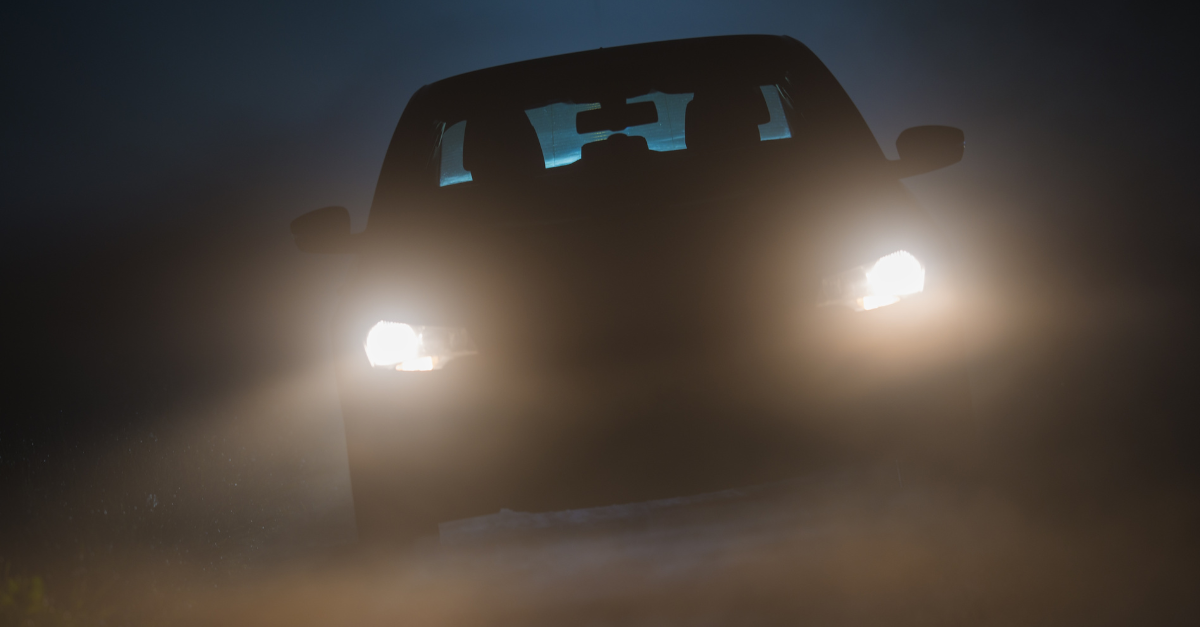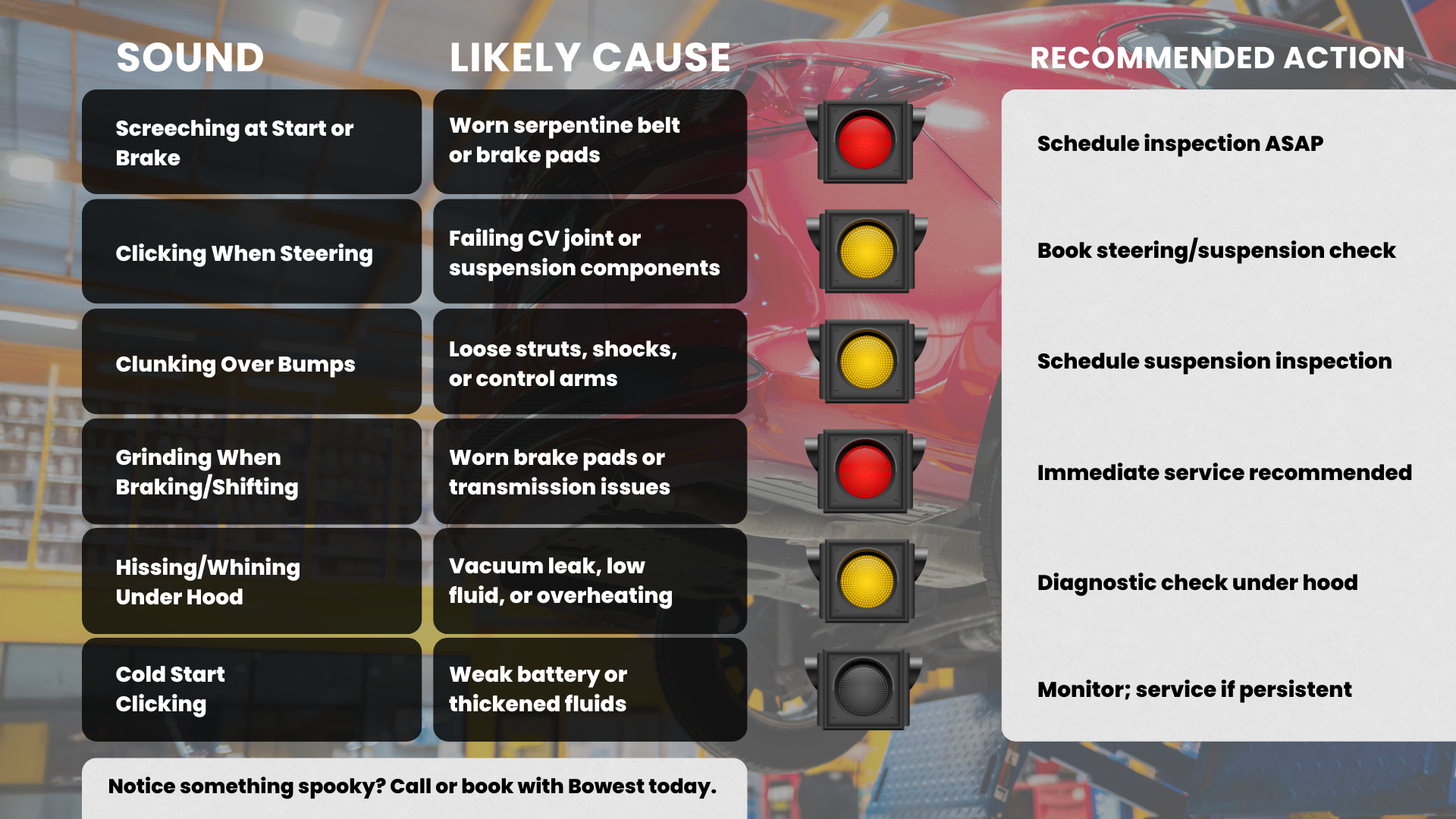Gremlins in the Garage? Bowest’s Haunted Guide to Weird Car Noises
Screeches, Clicks, Clunks: Top 5 Car Sounds You Shouldn’t Ignore
Not all scary noises come from haunted houses. Sometimes, they come from your garage. That high-pitched screech when you start your car? The rhythmic clunk when you hit a bump? The clicking that speeds up as you drive? These aren’t just spooky sounds—they’re signals your car is trying to send you.
Here are the top five weird noises you should never ignore:
1. Screeching When You Start or Brake
This is often caused by worn serpentine belts or brake pads. If the noise happens when you first turn the key or when you come to a stop, it’s likely one of those components crying out for help. Don’t wait—a snapped belt or worn-out brake pad can turn into a breakdown or safety hazard fast.
2. Clicking When You Turn the Steering Wheel
Clicking or popping noises when you steer could indicate a failing CV joint or worn-out suspension components. These issues affect how your wheels move and can compromise your control—especially on slippery Calgary roads.
3. Clunking Over Bumps
If your vehicle thuds or clunks when driving over potholes or uneven pavement, it may have a loose strut, shock, or control arm. Ignoring it can wear down other parts and lead to more expensive suspension repairs.
4. Grinding When You Shift or Brake
Grinding is never good. It could be your brake pads worn down to the metal, or worse, a failing transmission. Either way, it’s a red flag that something is being damaged every time you drive.
5. Hissing or Whining Under the Hood
These sounds can indicate a vacuum leak, overheating, or low fluid levels. If you hear a hiss after turning off the engine, your cooling system could be under stress—a common issue in both hot and freezing weather.
The bottom line: If it sounds wrong, it probably is. Trust your ears, and get it checked before a minor noise becomes a major repair.
How Calgary’s Cold Snaps Affect Engine & Suspension Noise
Cold weather has a sneaky way of amplifying car problems. In Calgary, our sudden temperature drops can make your car sound like it’s possessed. But there’s science behind the sounds.
Cold Makes Materials Contract
Metal, rubber, and plastic all shrink in the cold. This can cause belts to slip temporarily, hoses to stiffen, and fluids to move more slowly. So those squeals and groans you hear on a frosty morning? Often temperature-related.
Fluids Thicken
Oil, transmission fluid, and power steering fluid become more viscous in cold temperatures, increasing engine strain. This can create ticking or whining sounds until the car warms up. If noises persist after a few minutes of driving, it might be more than just cold-start stiffness.
Suspension Stiffens
Rubber bushings and shocks don’t absorb bumps as well when cold. That means you might hear more creaking or knocking over potholes and frost heaves. If those sounds continue even when it warms up, it’s time to check your suspension.
Cold Air Impacts Battery and Alternator
You might hear rapid clicking when starting your car in the cold. That’s often a low battery struggling to deliver enough power. Calgary winters are rough on batteries—most last three to five years max.
Not every cold-weather noise means trouble, but if it’s new, louder than usual, or doesn’t go away, let a mechanic take a listen.
Diagnosing the Unknown: What Your Mechanic Hears That You Don’t
Even if you’ve got a good ear, mechanics are trained to pick up what others can’t. At Bowest Motors, our technicians listen with experience and equipment. They know the difference between a harmless quirk and a real problem.
Here’s how they break down the spooky sounds:
Sound Location
Mechanics test drive the vehicle and listen for where the sound comes from—front, rear, under the hood, or near the wheels. This helps narrow down whether it’s a suspension issue, engine belt, wheel bearing, or something else.
Sound Pattern
Does the sound change with speed? Only happens when turning? Does it happen during cold starts only? These clues point toward specific systems or components.
Sound Type
Grinding, squeaking, hissing, popping, knocking—each noise has its own list of usual suspects. Mechanics match what they hear with known failure patterns across different makes and models.
Diagnostic Tools
In addition to their ears, technicians use scan tools, chassis ears, and pressure testers to isolate the problem. A strange clunk could be anything from a loose sway bar link to a failing motor mount, and tools help confirm the cause.
At Bowest, we never guess. Our inspections are methodical and thorough—so you're not left haunted by mystery repairs or repeat issues.
Preventing the Scary Stuff: Maintenance Tips Before Winter Hits
Weird noises are often just early warnings. Catching them early is the best way to prevent scary repairs later. Here’s how Calgary drivers can keep the gremlins at bay before winter:
1. Schedule a Fall Vehicle Inspection
Before the deep freeze arrives, drop by your trusted shop for vehicle maintenance. Ask for a full check of the suspension, brakes, belts, fluids, and battery. It’s easier (and cheaper) to replace a weak part now than in a snowstorm.
2. Don’t Delay on Warning Signs
If you hear a new sound, don’t wait. Strange noises rarely fix themselves. Early diagnosis helps avoid chain-reaction damage, where one worn-out part affects others.
3. Check Your Fluids
Make sure coolant, brake fluid, and oil are topped up and winter-ready. Contaminated or low fluids increase wear and tear.
4. Listen During Cold Starts
If a noise happens only when your car is cold, note how long it lasts and when it disappears. Let your mechanic know—those clues help pinpoint the issue.
5. Replace Worn Belts and Bushings
Rubber components are hit hardest by temperature swings. If they’re old, cracked, or noisy, replacing them now can prevent winter breakdowns.
6. Keep Up with Tire Maintenance
Worn tires can contribute to suspension noise and poor ride comfort. Check for uneven wear, rotate your tires, and switch to winter tires before the snow flies.
7. Know Your Vehicle’s History
Older vehicles or high-mileage cars are more likely to develop noise-related issues. Stay on top of their maintenance schedules and be proactive about inspections.
Calgary winters are tough on vehicles. But with a little fall prep and help from Bowest Motors, you can silence the gremlins and keep your vehicle running smoothly through the cold months ahead.
Stop by Bowest Motors in Bowness for a seasonal inspection, and let us track down any spooky sounds before they become nightmares. Because weird noises aren’t just annoying—they’re your car’s way of asking for help.


